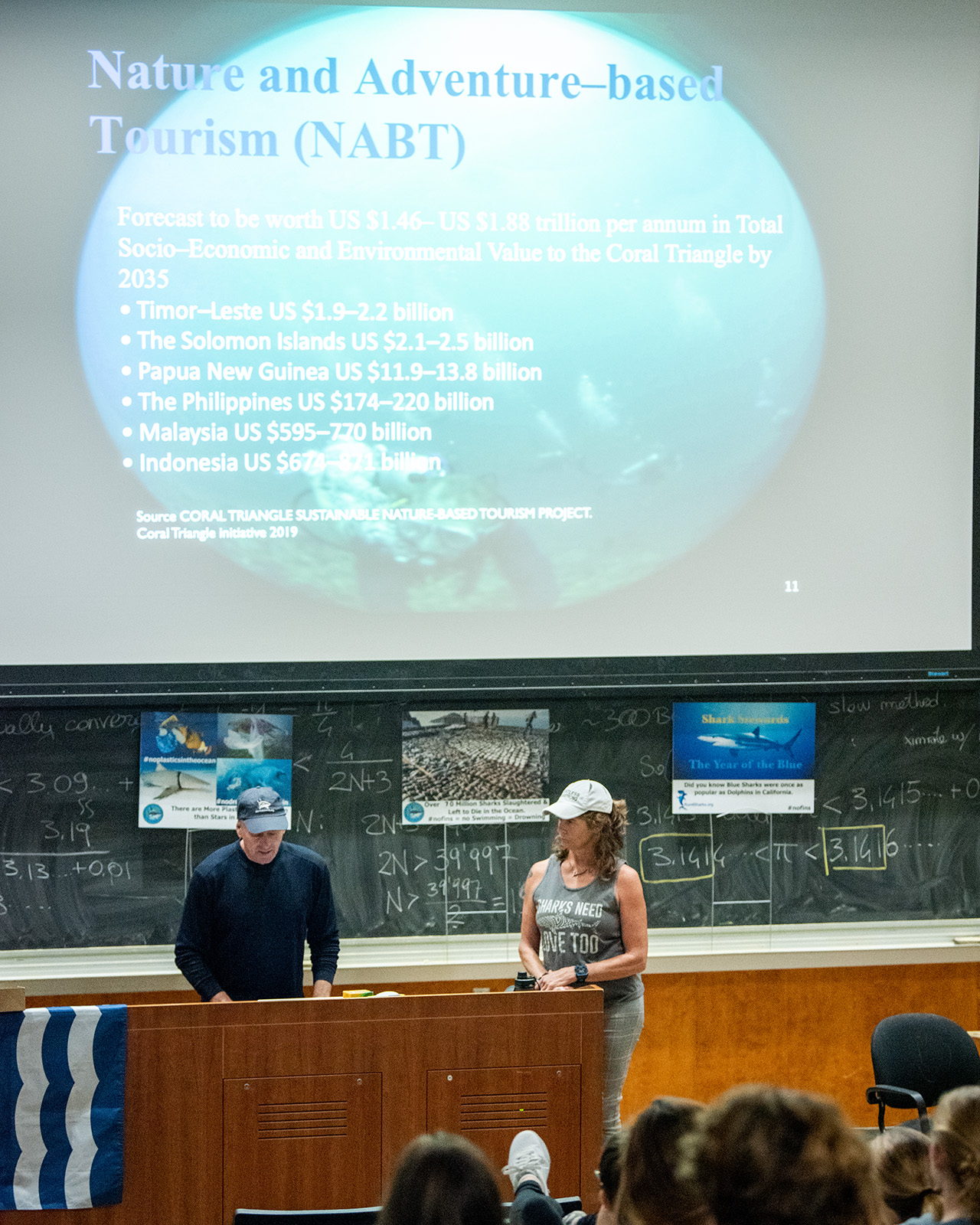Documentary screening event takes deep dive into shark conservation and advocacy

David McGuire (left), a marine biologist and the director of Shark Stewards, a national nonprofit shark advocacy group, and Maria Korcsmaros (right), the group’s Southern California chair and a shark attack survivor, spoke at a film screening Wednesday. (Alex Driscoll/Daily Bruin)

By Bernard Mendez
Nov. 22, 2019 5:40 p.m.
Maria Korcsmaros was training for a triathlon off the coast of Corona del Mar, California in 2016 when she was attacked by a 9- to 10-foot-long great white shark.
Korcsmaros was saved by nearby lifeguards who transported her to the hospital, where she received 161 staples and seven stitches, she said.
Although she was the victim of a shark attack, Korcsmaros has since become an advocate for the conservation of sharks and is currently the Southern California chair for Shark Stewards, a national nonprofit shark advocacy group.
“We have to have passion, we have to have something to push us forward,” Korcsmaros said. “For me, it was a way to recover and a way to understand why it happened to me.”
Korcsmaros was one of several shark conservation activists who spoke Wednesday at a showing of the documentary “Sharkwater Extinction,” hosted by the Surfrider Foundation Club at UCLA, a student organization focused on education and advocacy for ocean preservation and environmental awareness.
Released in 2018, “Sharkwater Extinction” follows late Canadian environmental filmmaker Rob Stewart as he investigates the global network of the shark fin industry. In the film, Stewart traveled to fishing communities in areas including Costa Rica, Panama and Los Angeles, to explore ways fishermen circumvent local restrictions on shark finning.
Stewart, who also wrote and directed the film, died in a diving accident while filming the movie.
According to the World Wildlife Fund, approximately 100 million sharks are killed annually. Sharks are popular for their fins, which are used to make shark fin soup, a luxury delicacy typically consumed in East Asian countries. A shark fin can sell for upward of $200 in some Chinese markets, according to the film.
David McGuire, a marine biologist and the director of Shark Stewards, said at the event that sharks play an important role in the health of an ecological system. In French Polynesia, the decrease in shark population because of hunting led to a fall in biodiversity, he added.
“(Sharks are) the regulators of the ocean ecosystem,” McGuire said. “When you remove those, it’s like taking the roof off the house or the wheels off the car, the whole system falls apart.”
McGuire said legislation to ban the buying and selling of shark fins in the United States, HR 737, passed through the United States House of Representatives on Wednesday. The resolution will need to pass through the Senate in order to be ratified, he said.
If passed, the U.S. would be the second nation to ban the sale and trade of shark fins after Canada, which enacted similar legislation in June, McGuire added.
Rhea Thielbar, a first-year marine biology student who attended the event, said she had heard about the shark fin industry in the past but didn’t realize how big of an impact it had until watching the film. She added that the film inspired her to continue to pursue a career in conservation.
Joe Gocke, the president of the Surfrider Foundation Club at UCLA and second-year biology student, said he gained an appreciation for the ocean while visiting his grandparents at the beach every Christmas.
Gocke, who has been surfing competitively for the past six years, said he was inspired to get involved in ocean conservation after seeing the effects of pollution on the ocean. Protecting the ocean is necessary to help reverse the effects of climate change, he said.
“The ocean is one of the biggest indicators of environmental change,” he said. “Protecting it is only going to help us.”
Korcsmaros, who is also a personal trainer and nutritionist, said she now wears the staples and stitches from her attack on a necklace. She said she has met with other shark attack survivors, led talks with elementary schools and hosted runs to benefit the Shark Stewards organization. Although she was a victim of a shark attack, she said she wants to use her voice to protect sharks in the future.
“When this happened to me, it was something that was bad, but when I heard about (McGuire), I looked around and realized what was happening to our planet,” Korcsmaros said. “I think it’s very much my responsibility, especially as an older person, to say this means something to me.”


